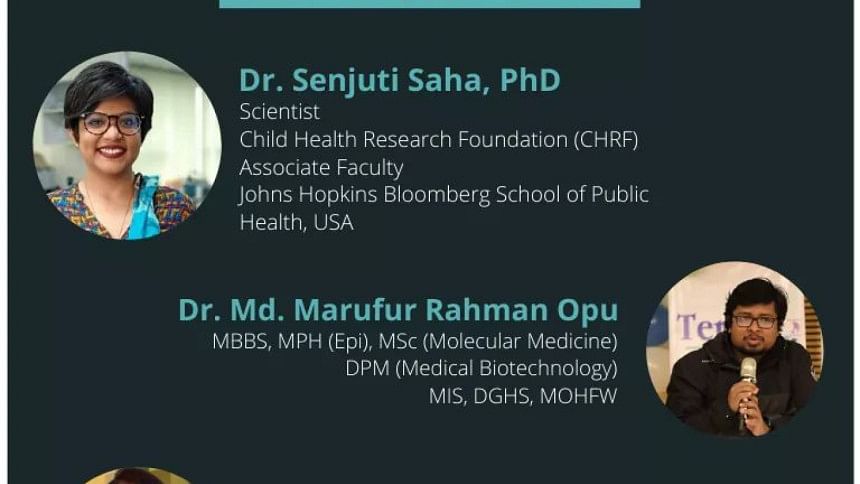YPF and Platform underscores investment in home grown research for better Covid-19 response

Being hit by the ongoing pandemic, Bangladesh is in need of enhancing and increasing the quality and quantity of research work and studies including comprehensive clinical trials and meta-analysis whilst encouraging abundant data generation. Currently, lack of coordination among different research institutes and organisations, limitations in data management and a significant communication gap among researchers, policy-makers and especially the masses are notably suppressing the possibility of conducting research in Bangladesh.
On June 14th, Youth Policy Forum (YPF) and Platform of Medical & Dental Society collaboratively organised a webinar titled "New Frontiers in Research: Vaccination, Genome Sequencing, and Data-Driven Health Surveillance", focusing on extensive clinical research strategies in Bangladesh along with abundant data-generation and maintenance of its sovereignty.
The panelists discussed the scope of extensive evidence-based research, need for advanced technology like genome sequencing, followed by effectuation of the upcoming vaccine against the novel coronavirus with experts.
Panelists participating in the discussion were Dr. Senjuti Saha (PhD), microbiologist and scientist at Child Health Research Foundation, and Dr. Md. Marufur Rahman Opu, who is currently the deputy program manager of medical biotechnology program, working with DGHS and MOHFW. The session was moderated by Anishta Khan, core member of YPF and a student of Public Health Studies at Johns Hopkins University.
The webinar started with Dr. Senjuti Saha describing genome sequencing and how her organisation pulled off the massive success. She went to explain how genome sequencing is not new in Bangladesh, where Bangladeshi scientists successfully sequenced genome of Hilsha fish and Jute in previous years. Last year CHRF did genome sequencing of respiratory syncytial virus, which is responsible for respiratory diseases, which turned out to be a practice for sequencing SARS-CoV-2 in the midst of this pandemic.
Dr. Senjuti also emphasised that greater use of advanced technology, such as metagenomics, will reduce the indiscriminate use of antibiotics as well as paving the way for less costly and efficient diagnosis for all.
Being asked how the research is going to support vaccine production, Dr. Senjuti replied, "The genome sequencing gives us answers about specific variants of the coronavirus that attacked our country. This will help scientists to create vaccines that we will be needing very soon."
Dr. Marufur praised the EPI system of vaccination in Bangladesh and gave his opinion on whether availability of vaccines here can be ensured, stating that, "If a vaccine arrives here, it can be sent to the most remote areas in Bangladesh in the shortest possible time through mass vaccination programs like EPI chain."
He also hopes that the vaccines won't be patented and that the pharmaceutical industry will come forward for large scale production.
The panel agreed that a positive effect of this pandemic is creating new infrastructure for research and a culture of sharing scientific knowledge.
Emphasising on the importance of data generation for research and studies, Dr. Senjuti discussed the limitations Bangladesh faces in terms of data collection and compilation. Lack of data translation and advocacy and a huge gap in science communication is exaggerating the challenges. When discussing the colonial undertones of research, she emphasised the need for increasing the capability and empowerment of the country's data generation system. She said, "Data is the new oil. So, we should be careful in preserving and nourishing it."
To Dr Senjuti, science communication is a subject of its own and to overcome this communication gap we must emphasise on quality education at a very basic level. Dr Opu suggested working in collaboration with community leaders and religious teachers for spreading authentic information as well as fighting misconceptions and rumours.
Another key issue in the discussion was funding for research. Dr. Opu mentioned that there are some government organisations like BMRC which offers grants and fellowships, and recently about a 100 crore budget was allocated alone for medical research purposes. But the government alone shouldn't bear all the burden. Dr Senjuti called for a combined effort to eradicate the obstacles for scientific academia and research in Bangladesh.
What awaits us? When will the pandemic go away? Dr. Senjuti expressed concerns on the immediate permanency of the coronavirus stating that, "The virus is not going to be eradicated anytime soon. While we're awaiting we must give attention to other diseases that are being neglected due to Covid-19. Vaccination gap for other diseases will be a challenge as long as the pandemic goes on. We need to start thinking about these challenges and ensure that we are not left with the burden of diseases neglected now in the post-Covid environment. "
There is no alternative to collaborative scientific research and we must adopt a rational way of thinking. Science is not only for scientists, and the current situation demands our collective attention to rationalism and medical literacy more than ever before.
Sayeda Nafeesa Islam is a final year MBBS student at Medical College for Women and Hospital and a staff reporter of Platform News Wing.
Saadi Abdullah is a newly graduated Doctor from Dhaka Medical College.

 For all latest news, follow The Daily Star's Google News channel.
For all latest news, follow The Daily Star's Google News channel. 



Comments